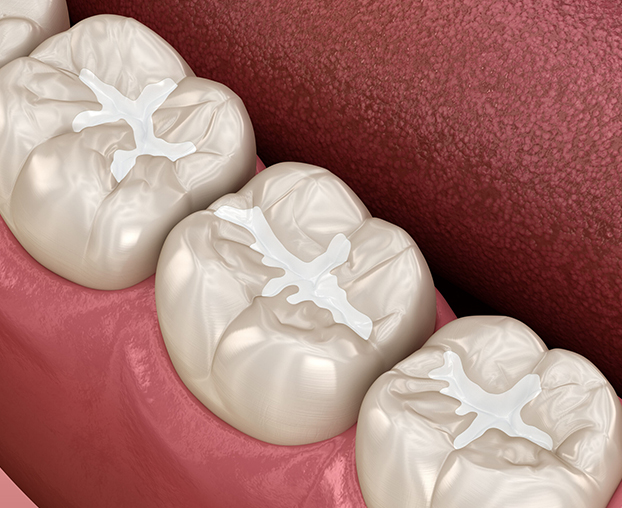Why Dental Sealants Protect Childs Teeth

Dental sealants are crucial for safeguarding your child's teeth
Sealants can prevent cavities
According to the Center for Disease Control, over 40% of children experience cavities in their baby teeth. Children may struggle to thoroughly brush all areas of their mouth, especially deep grooves in the back teeth which are prone to decay. Inadequate brushing can lead to plaque buildup in these areas.
Dental sealants provide a protective barrier against harmful bacteria by bonding with the tooth to create a strong surface. This barrier prevents food, debris, and bacteria from causing decay. Sealants are durable enough to withstand daily chewing forces and help prevent enamel erosion.
“The sealant gel bonds with the tooth to create a hard surface.”
Sealants are resistant to sugary and sticky foods
Many parents know that children enjoy eating foods that can cause cavities. Sugary and acidic foods and drinks are popular among kids, as well as sticky treats like toffees, taffies, and gummy candies.
These foods can stick to teeth and are hard to remove by brushing alone. Even with good oral hygiene, it can be difficult to completely get rid of the sugary residue. Bacteria feed on sugar, which can lead to cavities in the future. Sealants offer extra protection for the most at-risk areas of a child's mouth.
“Sealants help provide an added defense in the most vulnerable parts of a child’s mouth.”
Sealants can compensate for poor brushing habits
Keeping up with children's oral hygiene can be challenging. Some kids may skip brushing in the morning or forget to floss at night, and busy parents might not always catch these shortcuts. However, consistently skipping these important habits can result in serious dental issues over time.
While sealants are not a substitute for regular brushing and flossing, they can provide an extra layer of protection against bacteria and food particles that can damage enamel. This gives children a bit more time to stay on top of their oral hygiene routine. Dental sealants can be especially helpful for families with busy schedules.
“Sealants are not a replacement for regular brushing and flossing, but they make it harder for bacteria and food to penetrate the enamel.”
Sealants are recommended by dentists worldwide
Dental sealants come highly recommended by most dentists for their proven effectiveness. Studies by the American Dental Association show that sealants can reduce the risk of molar decay by up to 80%. The CDC reports that children without sealants are nearly three times more likely to develop cavities compared to those with sealants. This means fewer dental visits and less costly treatments in the future.
Sealants have been a staple in dentistry for over 50 years, with dentists conducting long-term studies on their effects. Organizations like the American Dental Association assure that sealants are safe for children and play a crucial role in protecting their oral health and preventing tooth decay.
“There is no credible evidence that sealants are associated with health risks.”
Sealants can help to prevent common dental problems
Preventive dentistry is essential for maintaining a healthy mouth in the long run. Taking preventative measures can help avoid future discomfort and save time. Treatments like filling cavities and repairing tooth decay can be painful and costly, causing stress and strain. Additionally, these procedures can lead to further complications over time.
An in-office sealant procedure is a quick and effective way to prevent future issues. Applying sealants takes less than an hour and can reduce the amount of time spent in the dentist's chair. This can be especially beneficial for patients who dislike dental visits.




